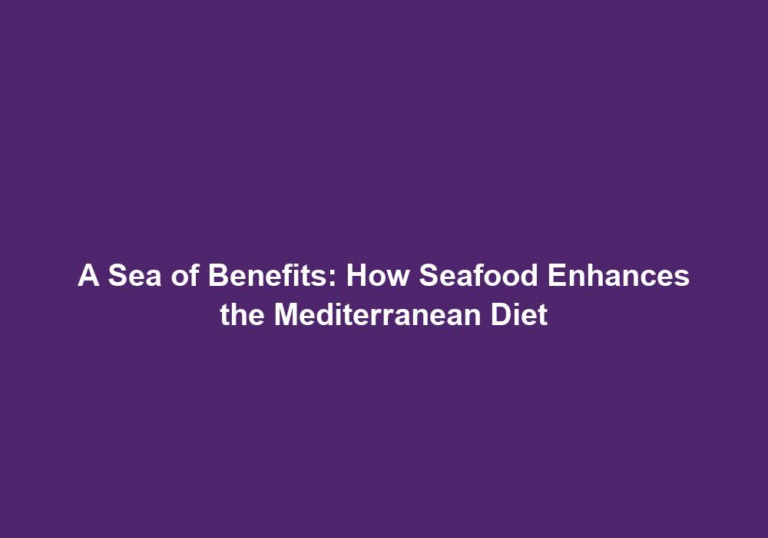Unlocking Oceanic Wellness: The Omega-3 Wonders of Seafood
Seafood has long been celebrated for its numerous health benefits, and one of the key reasons behind its popularity is its high content of omega-3 fatty acids. These essential fats play a crucial role in promoting overall wellness, particularly when it comes to our heart and brain health. Dive into the world of oceanic wellness and discover the wonders that seafood, with its abundant omega-3 content, has to offer.
The Importance of Omega-3 Fatty Acids
Before we delve into the omega-3 wonders of seafood, let’s understand why these fatty acids are so important for our well-being. Omega-3s are a type of polyunsaturated fat that our bodies cannot produce on their own, so we must obtain them from our diet.
Omega-3 fatty acids are integral for maintaining the structure and function of our cells, especially those in the brain, eyes, and heart. They are known as essential fats because they are necessary for our bodies to function properly. These fatty acids also support the body’s inflammatory response, provide energy, and aid in the absorption of fat-soluble vitamins.
Omega-3s and Heart Health
When it comes to heart health, omega-3 fatty acids have shown remarkable benefits. Several studies have linked a higher consumption of omega-3s to a reduced risk of heart disease. These fatty acids help lower blood pressure, reduce triglyceride levels, and decrease the risk of abnormal heart rhythms.
Including seafood in your diet regularly, such as fatty fish like salmon, mackerel, and sardines, can contribute to maintaining a healthy heart. These types of fish are rich in omega-3 fatty acids, specifically eicosapentaenoic acid (EPA) and docosahexaenoic acid (DHA), which have been shown to have significant cardiovascular benefits. The American Heart Association recommends consuming at least two servings of fish per week to reap these heart-healthy benefits.
In addition to their heart-protective effects, omega-3s also help to reduce inflammation in the body, which is a key factor in the development of heart disease. By including seafood in your diet, you can help reduce the risk of heart-related complications and promote overall cardiovascular well-being.
Omega-3s and Brain Function
Our brains rely on omega-3 fatty acids for optimal function. These fats are crucial for brain development during pregnancy and early life, and they continue to play a vital role in supporting brain health throughout our lives.
Several studies have suggested that omega-3s can improve cognitive function, memory, and overall mental well-being. They may also help reduce the risk of age-related mental decline, such as Alzheimer’s disease. The omega-3 fatty acids EPA and DHA are particularly important for brain health, as they are major structural components of brain tissue and are involved in the transmission of signals between brain cells.
Incorporating seafood into your diet, particularly fatty fish, can provide your brain with the necessary omega-3s it needs to thrive. These fatty acids help support brain cell structure and function, promote the growth of new brain cells, and enhance communication between brain cells. Including omega-3 supplements may also be beneficial for individuals who don’t consume seafood or have difficulty meeting their daily requirements.
Other Health Benefits of Omega-3s
The benefits of omega-3 fatty acids extend beyond heart and brain health. These essential fats have been linked to various other health benefits, including:
1. Eye Health
Omega-3s contribute to the structural integrity of the retina, the part of the eye responsible for capturing images. Adequate intake of these fatty acids has been associated with a lower risk of age-related macular degeneration, which is one of the leading causes of vision loss in older adults. DHA, in particular, is highly concentrated in the retina and is essential for maintaining healthy vision.
Including seafood in your diet can help ensure a sufficient intake of omega-3s for optimal eye health. Fatty fish like salmon, tuna, and trout are especially rich in these fatty acids and can support the health of your eyes.
2. Joint Health
Omega-3s possess anti-inflammatory properties, making them beneficial for individuals with joint conditions such as arthritis. Inflammation plays a key role in the development and progression of joint pain and stiffness. Including seafood in your diet can help reduce inflammation and alleviate symptoms associated with joint conditions, improving overall joint health and mobility.
The omega-3 fatty acids EPA and DHA have been shown to reduce joint pain, morning stiffness, and the need for pain medication in individuals with rheumatoid arthritis. By incorporating seafood into your meals, you can harness the anti-inflammatory power of omega-3s and support your joint health.
3. Skin Health
The omega-3 fatty acids found in seafood help to nourish the skin, keeping it healthy and radiant. These fatty acids have anti-inflammatory properties that can reduce skin inflammation and improve symptoms of skin conditions like eczema and psoriasis.
Regular consumption of omega-3s may also protect the skin from sun damage caused by harmful UV rays. These fatty acids help to strengthen the skin’s natural barrier function, reducing the risk of sunburn and skin damage. Including seafood in your diet can provide your skin with the necessary nutrients it needs to maintain a healthy appearance.
4. Mental Health
Research suggests that omega-3s may have a positive impact on mental health conditions such as depression and anxiety. These fatty acids help regulate neurotransmitters in the brain, which are responsible for mood regulation. By including seafood in your diet, you may be able to support your mental well-being and improve symptoms associated with these conditions.
The omega-3 fatty acid EPA, in particular, has been shown to be beneficial for individuals with depression. It can help increase the production of serotonin, a neurotransmitter that plays a key role in mood regulation. Including seafood in your meals can provide a natural source of EPA and potentially alleviate symptoms of depression and anxiety.
Choosing and Preparing Seafood for Optimal Omega-3 Intake
To fully unlock the omega-3 wonders of seafood, it’s essential to make informed choices when selecting and preparing your meals. Consider the following tips:
- Opt for fatty fish, such as salmon, trout, and tuna, as they contain higher levels of omega-3 fatty acids. These types of fish have been shown to have the highest concentrations of EPA and DHA.
- Choose wild-caught fish over farm-raised varieties whenever possible, as they tend to have a higher omega-3 content. Wild-caught fish also have a more diverse and nutrient-rich diet, which contributes to their higher omega-3 levels.
- Experiment with different seafood recipes to keep your meals exciting and enjoyable. There are numerous delicious and healthy seafood recipes available that can help you incorporate omega-3-rich fish into your diet.
- Avoid deep-frying seafood, as it can reduce the nutritional value and increase calorie content. Instead, opt for healthier cooking methods such as grilling, baking, or steaming to preserve the omega-3 content.
- If you’re concerned about mercury levels, opt for smaller fish like sardines and anchovies, which tend to have lower mercury levels. These fish are still excellent sources of omega-3s and can be incorporated into a variety of dishes.
By following these tips, you can ensure that you’re maximizing your omega-3 intake and reaping the full benefits of seafood for your overall wellness.
Conclusion
Seafood, with its abundance of omega-3 fatty acids, is a treasure trove for our overall wellness. From promoting heart health to enhancing brain function and offering numerous other benefits, the wonders of omega-3s are undeniable. By incorporating seafood into our diets and making mindful choices, we can unlock the full potential of oceanic wellness and enjoy a healthier, happier life.







